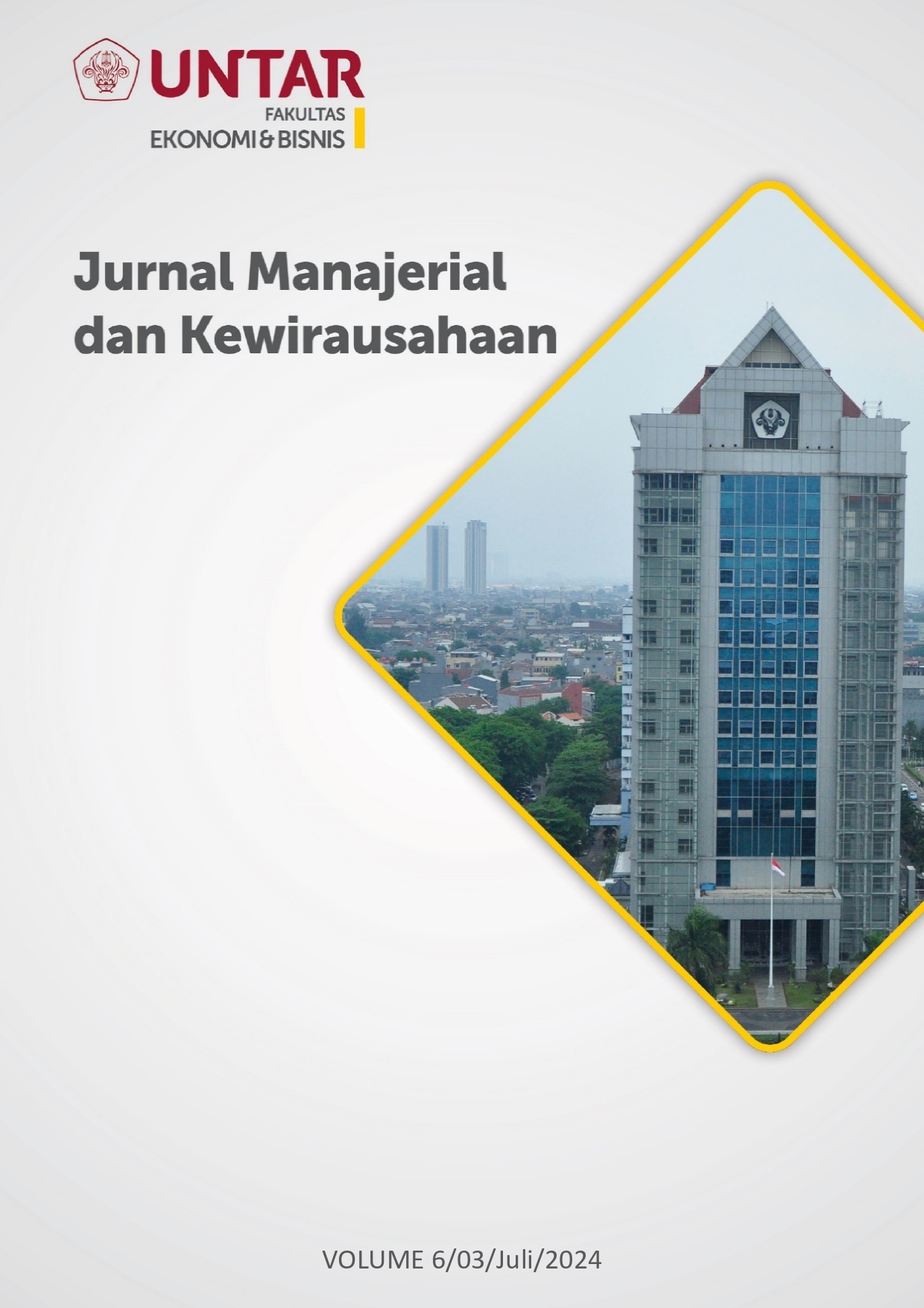Intensi Berwirausaha Dilihat dari Aspek Kepribadian Proksimal pada Mahasiswa FEB Universitas Tarumanagara
Main Article Content
Abstract
Based on a survey conducted by the Central Statistics Agency (BPS) in Indonesia, it can be seen that the unemployment rate in this country is relatively high and needs to be addressed. One way to overcome this is by creating a business, which will indirectly open up many job opportunities. Many parties from various circles are interested in entrepreneurship and can pioneer the establishment of a business, one of which is students. However, as individuals who have freedom, students also have many considerations that are influenced by their surrounding environment, andone of the important influencing elements is the element of personality. Therefore, this research aims to determine the influence of personality elements including risk- taking, self-efficacy, proactiveness, creativity, and entrepreneurial alertness on students' entrepreneurial intentions with risk-taking, creativity, and self-efficacy as mediating variables. Data was collected using a questionnaire from 235 respondents, all of whom consisted of students at one of the universities in Jakarta. Data collection was carried out using a purposive sampling method. The data processing technique used isStructural Equation Modeling (SEM) analysis using SmartPLS4 software. The results of the research that has been conducted show that risk-taking, self-efficacy, proactiveness, creativity, and entrepreneurial alertness have a positive and significant influence on students' entrepreneurial intentions with risk-taking, creativity, and self- efficacy variables as mediation.
Article Details
Section

This work is licensed under a Creative Commons Attribution-NonCommercial-ShareAlike 4.0 International License.
This work is licensed under a Jurnal Muara Ilmu Ekonomi dan Bisnis Creative Commons Attribution-ShareAlike 4.0 International License.,/p>
References
Databoks. (2023, November 1). Awal 2023, Ada 7,9 Juta Pengangguran di Indonesia. Retrieved from: https://databoks.katadata.co.id/datapublish/2023/05/05/awal-2023-ada-79-juta-pengangguran-di-indonesia
Hsieh, H. H. & Huang, J. T. (2014). The Effects of Socioeconomic Status and Proactive Personality on Career Decision Self-Efficacy. The Career Development Quarterly, 62(1), 29–43. https://doi.org/10.1002/j.2161-0045.2014.00068.x
Jefry, J. & Soelaiman, L. (2023). Faktor yang Memengaruhi Minat Berwirausaha Generasi Z di Jakarta. Jurnal Manajerial dan Kewirausahaan, 5(4), 971-978. https://doi.org/10.24912/jmk.v5i4.26966
Junça-Silva, A., Duarte, H., & Santos, S. C. (2023). Personal initiative, risk-taking, creativity and opportunity discovery among students. Journal of Enterprising Communities: People and Places in the Global Economy. https://doi.org/10.1108/JEC-10-2022-0150
Liu, W., van der Linden, D., & Bakker, A. B. (2022). Strengths use and work-related flow: An experience sampling study on implications for risk taking and attentional behaviors. Journal of Managerial Psychology, 37(1), 47-60. https://doi.org/10.1108/JMP-07- 2020-0403
Llados-Masllorens, J., & Ruiz-Dotras, E. (2021). Are women's entrepreneurial intentions and motivations influenced by financial skills?. International Journal of Gender and Entrepreneurship, 14(1), 69-94. https://doi.org/10.1108/IJGE-01-2021- 0017
Martínez-Martínez, S. L. (2022). Entrepreneurship as a multidisciplinary phenomenon: culture and individual perceptions in business creation. Academia Revista Latinoamericana de Administración, 35(4), 537-565. https://doi.org/10.1108/ARLA-02-2021-0041
Muldoon, J., Lucy, C., & Lidzy, S. (2019). The impact of social dominance orientation on female entrepreneurial intention. New England Journal of Entrepreneurship, 22(2), 109-125. https://doi.org/10.1108/NEJE-05-2019-0025
Nikou, S., Brännback, M., Carsrud, A. L., & Brush, C. G. (2019). Entrepreneurial intentions and gender: pathways to start-up. International Journal of Gender and Entrepreneurship, 11(3), 348-372. https://doi.org/10.1108/IJGE-04-2019-0088
Obschonka, M., & Stuetzer, M. (2017). Integrating psychological approaches to entrepreneurship: the Entrepreneurial Personality System (EPS). Small Business Economics, 49, 203-231. https://doi.org/10.1007/s11187-016-9821-y
Olivia, J., Nurfebiaraning, S. (2019). Pengaruh Video Advertising Tokopedia Versi “Jadikan Ramadan Kesempatan Terbaik” Terhadap Respon Afektif Khalayak. Jurnal Lontar, 7(1). https://doi.org/10.30656/lontar.v7i1.1564
Pangestu, J. & Wijaya, A. (2020). Pengaruh Modal Sosial terhadap Penciptaan Usaha Baru yang Dimediasi oleh Efikasi Diri pada Mahasiswa Jurusan Manajemen Fakultas Ekonomi dan Bisnis Universitas Tarumanagara. Jurnal Manajerial dan Kewirausahaan, 2(2), 510-519. https://doi.org/10.24912/jmk.v2i2.7945
Rocha, A. K. L. D., Moraes, G. H. S. M. D., & Fischer, B. (2022). The role of university environment in promoting entrepreneurial behavior: evidence from heterogeneous regions in Brazil. Innovation & Management Review, 19(1), 39-61. https://doi.org/10.1108/INMR08-2020-0112
Rummel, S., Akkermans, J., Blokker, R., & Van Gelderen, M. (2021). Shocks and entrepreneurship: A study of career shocks among newly graduated entrepreneurs. Career Development International, 26(4), 562-581. https://doi.org/10.1108/CDI-11-2018-0296
Seibert, S.E.; Sargent, L.D.; Kraimer, M.L.; Kiazad, K. (2017). Linking Developmental Experiences to Leader Effectiveness and Promotability: The Mediating Role of Leadership Self-Efficacy and Mentor Network. Pers. Psychol, 70, 357–397.
Waruwu, K. K., & Sahir, S. H. (2022). Pengaruh E-Service Quality dan Brand Image Terhadap E- Loyalty pada Pengguna Aplikasi Shopee. Journal of Business and Economics Research (JBE), 3(3), 335-341. https://doi.org/10.47065/jbe.v3i3.2298
Wijaya, A., Ekadjaja, A., & Geovanny, C. (2021). Pengaruh Openness dan Entrepreneurial Self Efficacy terhadap Entrepreneurial Intention Dimoderasi Entrepreneurship Education dan Gender. Jurnal Management Ultima, 13(1), 62-73. https://doi.org/10.31937/ manajemen.v13i1.1942
Yu, C., Ye, B., & Ma, S. (2021). Creating for others: Linking prosocial motivation and social entrepreneurship intentions. Management Decision, 59(11), 2755-2773. https://doi.org/10.1108/MD-06-2019-0815

